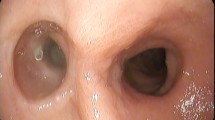Abstract
Background
Laparoscopic sleeve gastrectomy (LSG) is increasingly playing a key role in obesity management. Such operations, however, carry complications sometimes including leaks. The esophageal stent is one of the frequent options used to treat leaks after a sleeve gastrectomy. The fully covered stents are the ones of choice. However, their use can result in serious consequences requiring aggressive solutions. The longer the stent is maintained, there is more risk of withdrawal, even esophageal mucosal avulsion developing stenosis afterward. Endoscopic stenting is a double-edged sword that must be handled cautiously.
Materials and Methods
A 36-year-old woman with BMI 44 and obstructive apnea syndrome undergoing laparoscopic sleeve gastrectomy in November 2017 with a 36 Fr bougie and reinforced staplers. She presented a leak as immediate complication. It was initially treated with an esophageal stent and removed 2 months afterwards with a mucosal avulsion during the procedure. She developed after an esophageal stenosis which was treated with enteral nutrition and endoscopic dilatations for 6 months without results.
Results
We present an open esophagectomy with ileocoloplasty reconstruction due to intrathoracic esophageal stricture after conservative management with partially covered metal stents and dilatations of a leak in a laparoscopic sleeve. She presented a neck leakage in the postoperative period with a good evolution after parenteral nutrition for 3 weeks and antibiotic therapy. She was discharged one month after surgery eating soft food in a reasonable manner.
Conclusions
Although one of the existing options to treat leaks after a sleeve gastrectomy is the use of an esophageal stent, it is essential to choose the correct type, being the fully covered the ones of choice. The use of self-expandable metal stents appears to be a safe and effective method in the treatment of post-LSG leaks. The longer it is maintained, there is more risk in withdrawal, even esophageal mucosal avulsion. Endoscopic stenting is a double-edged sword that must be handled cautiously.
Similar content being viewed by others
Author information
Authors and Affiliations
Corresponding author
Ethics declarations
Ethics Approval
All procedures performed in studies involving human participants were in accordance with the ethical standards of the institutional and/or national research committee and with the 1964 Helsinki Declaration and its later amendments or comparable ethical standards.
Consent to Participate
Informed consent was obtained from all individual participants included in the study.
Conflict of Interest
The authors declare no competing interests.
Additional information
Publisher’s Note
Springer Nature remains neutral with regard to jurisdictional claims in published maps and institutional affiliations.
Supplementary Information
(MP4 274268 kb)
Rights and permissions
About this article
Cite this article
Ruiz-Úcar, E., Acín-Gándara, D., Medina-García, M. et al. Esophagectomy with Ileocoloplasty, Last Treatment for a Leak After Laparoscopic Sleeve: “From Less to More”. OBES SURG 32, 569–570 (2022). https://doi.org/10.1007/s11695-021-05707-0
Received:
Revised:
Accepted:
Published:
Issue Date:
DOI: https://doi.org/10.1007/s11695-021-05707-0




